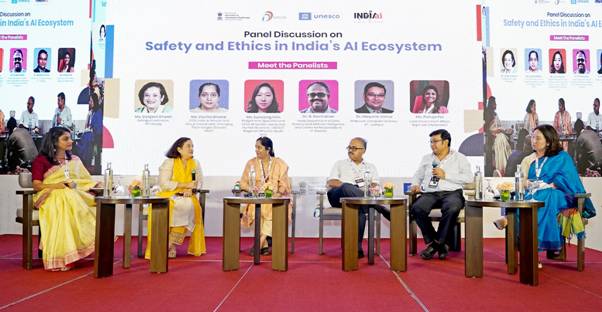UNESCO and MeitY Conclude Final AI Readiness Consultation in India: Building the Foundation for Ethical AI Governance
The UNESCO Regional Office for South Asia, in collaboration with the IndiaAI Mission and with legal and policy support from Ikigai Law, hosted the fifth and final stakeholder consultation on the AI Readiness Assessment Methodology (RAM). Held at the Shangri-La Eros Hotel, New Delhi, the consultation drew over 200 participants from across government, academia, industry, and civil society to deliberate on strategies for responsible and ethical AI adoption in India.
This event marked the culmination of a national engagement series, following successful consultations in Bangalore, Hyderabad, Guwahati, and a prior session in New Delhi. The initiative seeks to co-develop an India-specific AI policy roadmap that aligns technological progress with ethical and inclusive development.
The Vision Behind AI RAM
The AI Readiness Assessment Methodology (RAM) is a diagnostic tool developed by UNESCO in partnership with MeitY’s IndiaAI Mission. It is designed to help governments evaluate their existing capacities in AI development and identify gaps in regulatory, institutional, and human capital ecosystems. The goal: build a strong, ethical, and transparent AI framework tailored to India’s socio-economic context.
This initiative is in line with India’s growing commitment to its IndiaAI Mission, specifically the Safe and Trusted AI pillar, which promotes safety, accountability, and transparency in AI innovation. The RAM initiative emphasizes the development of indigenous governance tools, self-assessment frameworks, and collaborative policy models to empower all stakeholders in India’s AI ecosystem.
Event Highlights
Opening Remarks:
Mr. Tim Curtis, Director of the UNESCO Regional Office for South Asia, opened the consultation by stressing the importance of designing AI systems with ethics embedded from inception. He reiterated UNESCO’s support for India’s ambition to create a digital ecosystem that is inclusive, transparent, and built on trust.
Keynote Address:
Mr. Abhishek Singh, Additional Secretary at MeitY, CEO of the IndiaAI Mission, and Director General of the NIC, emphasized India’s balanced and pro-innovation approach. He outlined key IndiaAI initiatives such as:
-
AI Kosh – a central platform for annotated datasets
-
Foundation model development – supporting indigenous AI models
-
Responsible AI programs – promoting ethical development across sectors
Panel Discussion: Safety and Ethics in India’s AI Ecosystem
The panel featured distinguished experts:
-
Ms. Debjani Ghosh, Distinguished Fellow, NITI Aayog
-
Ms. Kavita Bhatia, COO, IndiaAI Mission and Group Coordinator, MeitY
-
Ms. Eunsong Kim, Chief, Social and Human Sciences, UNESCO South Asia
-
Dr. B. Ravindran, Head, Data Science & AI, IIT-Madras
-
Dr. Mayank Vatsa, Professor, Computer Science, IIT-Jodhpur
Discussions revolved around India’s AI policy direction, challenges in implementing ethical AI, and the importance of public-private collaboration. Ms. Ghosh called balancing AI’s benefits and risks the “defining challenge of our time,” while Ms. Bhatia emphasized the collaborative DNA of the IndiaAI Mission.
Breakout Sessions: Deep-Dive into Policy Areas
The consultation also hosted focused breakout sessions on:
-
AI Governance & Ethics
-
Infrastructure & Technical Readiness
-
Workforce Development & Skills Gap
-
Sectoral Adoption of AI in Health, Agriculture, and Education
-
Youth Participation in AI Governance
Participants shared on-the-ground challenges and opportunities, helping shape a participatory policy framework that reflects diverse Indian contexts and stakeholder insights.
The inputs from this and previous consultations will form the basis of a comprehensive India-specific AI policy report. The report will:
-
Highlight national AI strengths
-
Identify regulatory and capacity gaps
-
Recommend actionable strategies for ethical AI deployment
-
Support India’s positioning as a global leader in responsible AI innovation
This initiative sets a precedent for multilateral, multi-stakeholder collaboration, reinforcing India’s path toward a sustainable, inclusive, and trustworthy AI future.

